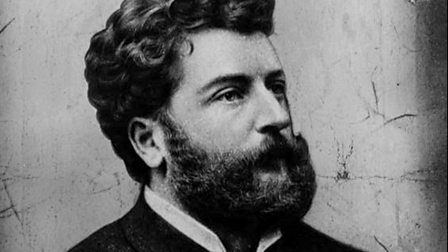Georges Bizet, born on October 25, 1838, in Paris, France, was a brilliant and influential composer of the Romantic era. His full name was Alexandre-César-Léopold Bizet, and he displayed exceptional musical talent from a young age. Despite his relatively short life, Bizet's compositions, particularly his operas, have left an enduring legacy in the world of classical music.
Bizet's musical education began at the Paris Conservatoire, where he studied piano and composition. His early compositions showed promise, and he won the prestigious Prix de Rome in 1857, which allowed him to spend several years in Italy, immersing himself in the rich cultural and musical traditions of the region. This experience greatly influenced his musical style and gave him a broader perspective on composition.
Georges Bizet, a renowned composer of the Romantic era, left an indelible mark on the world of music with his captivating melodies and daring compositions. Born on October 25, 1838, in Paris, Bizet's musical genius was evident from a young age. His extraordinary talent, coupled with his audacious artistic choices, cemented his place in history as one of the most influential composers of his time. This blog post delves into the captivating biography of Georges Bizet, exploring the highlights of his life and the enduring legacy he left behind.
Georges Bizet was a French composer and pianist, born on October 25, 1838, in Paris, France. He is best known for his operas, particularly his masterpiece, "Carmen," which has become one of the most performed and beloved operas of all time.
Bizet came from a musical family, and his talent for music was evident from an early age. His father, Adolphe Bizet, was a singing teacher and composer, and his mother, Aimée Delsarte, was a talented pianist. Recognizing his son's potential, Adolphe gave Georges his first music lessons and nurtured his passion for the art.
Georges Bizet (25 October 1838 – 3 June 1875), registered at birth as Alexandre César Léopold Bizet, was a French composer of the Romantic era. Best known for his operas in a career cut short by his early death, Bizet achieved few successes before his final work, Carmen, which has become one of the most popular and frequently performed works in the entire opera repertoire.
During a brilliant student career at the Conservatoire de Paris, Bizet won many prizes, including the prestigious Prix de Rome in 1857. He was recognised as an outstanding pianist, though he chose not to capitalise on this skill and rarely performed in public. Returning to Paris after almost three years in Italy, he found that the main Parisian opera theatres preferred the established classical repertoire to the works of newcomers. His keyboard and orchestral compositions were likewise largely ignored; as a result, his career stalled, and he earned his living mainly by arranging and transcribing the music of others. Restless for success, he began many theatrical projects during the 1860s, most of which were abandoned. Neither of his two operas that reached the stage in this time—Les pêcheurs de perles and La jolie fille de Perth—were immediately successful.
After the Franco-Prussian War of 1870–1871, during which Bizet served in the National Guard, he had little success with his one-act opera Djamileh, though an orchestral suite derived from his incidental music to Alphonse Daudet's play L'Arlésienne was instantly popular. The production of Bizet's final opera, Carmen, was delayed because of fears that its themes of betrayal and murder would offend audiences. After its premiere on 3 March 1875, Bizet was convinced that the work was a failure; he died of a heart attack three months later, unaware that it would prove a spectacular and enduring success.
Bizet's marriage to Geneviève Halévy was intermittently happy and produced one son. After his death, his work, apart from Carmen, was generally neglected. Manuscripts were given away or lost, and published versions of his works were frequently revised and adapted by other hands. He founded no school and had no obvious disciples or successors. After years of neglect, his works began to be performed more frequently in the 20th century. Later commentators have acclaimed him as a composer of brilliance and originality whose premature death was a significant loss to French musical theatre.
Georges Bizet
Tracklist:
Ópera Carmen
1. Prélude
2. La Cloche a Sonnée
3. L’Amour Est un Oiseau Rebelle
4. Près des Remparts de Séville (seguidilla e dueto)
5. Votre Toast, Je Peux Vous le Rendre
6. La Fleur Que Tu M’Avais Jetée
7. Entr’acte
8. Écoute, Écoute, Compagnon
9. Je Dis Que Rien Ne M’Épouvante
10. Les Voici! Les Voici!
Suíte L’Arlésienne
11. Prélude (Allegro deciso. Tempo di marcia)
12. Menuet (allegro giocoso)
13. Adagietto
14. Carillon (allegretto moderato)
For more:
http://www.melhoresmusicasclassicas.blogspot.com
#MusicHistory
#ClassicalMusic
#Bizet

